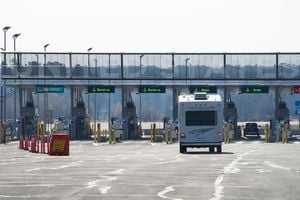Germany's political landscape is set to undergo significant changes as the Union (CDU/CSU) and the Social Democratic Party (SPD) have reached a coalition agreement after nearly four weeks of negotiations. Announced on April 9, 2025, this agreement marks a pivotal moment following the collapse of the previous 'Ampel' coalition, which included the Greens and the Free Democrats (FDP) in late 2024.
The coalition agreement, encompassing 144 pages, outlines a variety of policy initiatives and cabinet appointments that will shape the direction of the German government. CDU leader Friedrich Merz, who is poised to become the next Chancellor, emphasized the importance of delivering results, stating, "We have a strong plan ahead of us with which we can jointly bring our country forward again." This sentiment reflects a broader commitment from both the CDU and SPD to address pressing national issues.
As part of their agreement, the CDU will oversee key ministries including the Federal Chancellery, Economy and Energy, and Health, while the SPD will manage Finance, Justice, and Defense among others. The CSU will also play a vital role by taking charge of the Interior and Agriculture ministries. This distribution aims to ensure a balanced representation within the new government.
One of the more controversial aspects of the coalition agreement is the suspension of family reunification for refugees with subsidiary protection status, a move criticized by various humanitarian organizations. Christian Stäblein, the Refugee Commissioner of the Evangelical Church in Germany, expressed disappointment over this decision, calling it a "fatal and wrong signal" for refugees seeking stability.
Additionally, the coalition intends to abolish the current Bürgergeld system, which has provided financial support to unemployed individuals. This change is expected to tighten eligibility criteria and impose stricter sanctions on those failing to comply with job-seeking requirements.
On the environmental front, the coalition has received mixed responses. The chairman of the BUND, Olaf Bandt, warned that the new government intends to "undermine and dismantle central achievements" in climate policy, particularly criticizing plans to abolish the heating law. Environmental groups have expressed concern that such actions could reverse progress made in climate protection.
In terms of economic policy, the coalition has pledged to implement significant reforms aimed at boosting investment and economic growth. This includes a gradual reduction of the corporate tax rate starting in 2028 and a degressive depreciation model for equipment investments, which is expected to provide immediate relief to businesses.
Markus Söder, the CSU leader, has also indicated plans for a substantial increase in border controls, stating that rejections at German borders will be enforced from day one of the new government. This move aligns with the coalition's commitment to managing migration more effectively, a point Merz has reiterated by emphasizing the need to limit illegal immigration.
The coalition's approach to immigration policy has sparked criticism, particularly from the Greens and the Left Party, who argue that the agreement fails to address the humanitarian aspects of migration. Felix Banaszak, the leader of the Greens, labeled the coalition agreement as "claptrap" that does not meet the urgent demands of the time.
As the new government prepares to take office, Friedrich Merz faces the task of convincing both party committees and SPD members of the coalition's viability. A vote for the coalition agreement is expected to take place in early May, with Merz aiming for election as Chancellor shortly thereafter.
The coalition has also promised to establish working groups to tackle pressing issues in healthcare, pensions, and social security, with CDU Chairman Merz assuring that these commissions will commence immediately after taking office. This proactive approach highlights the coalition's commitment to addressing long-standing concerns within these sectors.
Despite the optimism surrounding the coalition's formation, there are significant challenges ahead. The SPD's Lars Klingbeil has indicated that the party will not announce its ministerial appointments until after the members' decision on the coalition agreement, reflecting a cautious approach to governance.
In conclusion, the newly formed black-red coalition is poised to enact a series of sweeping changes across various sectors in Germany. While there is hope for progress, the path ahead will require careful navigation of both domestic and international challenges. As the coalition prepares to take office, all eyes will be on how they fulfill their ambitious agenda amidst a backdrop of economic uncertainty and social demand for equity.







